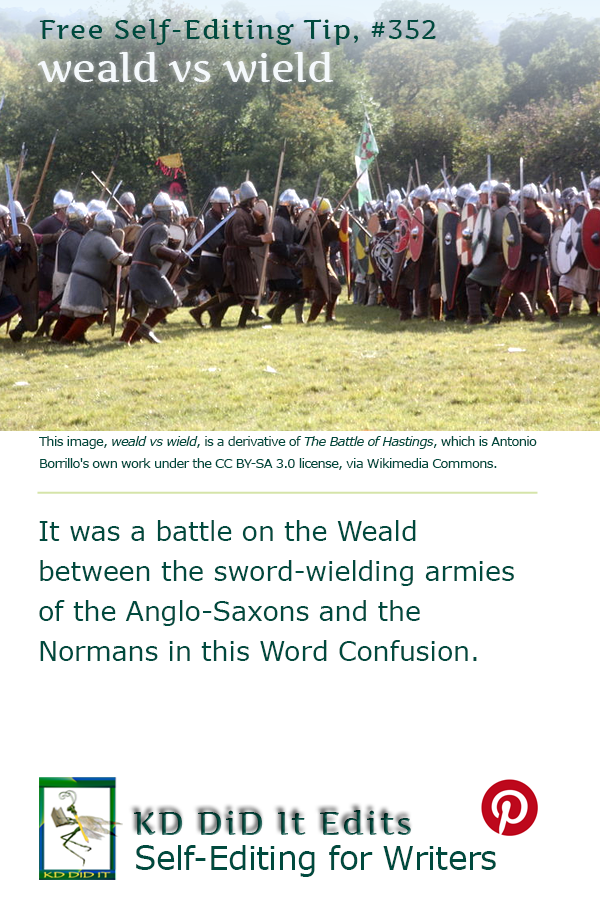Revised as of
11 Jan 2023
Yeahhh, no. I do realize that archaic or obsolete spellings can be interesting, but the closest weald and wield come is one has an a and the other has an i. Otherwise, noun versus verb?? Woods versus “weapon”?? It’s a no-brainer.
The only real difference between the intransitive and transitive verb form of wield is strictly based on if the verb is directly or indirectly affecting an object.
Word Confusions . . .
. . . started as my way of dealing with a professional frustration with properly spelled words that were out of context in manuscripts I was editing as well as books I was reviewing. It evolved into a sharing of information with y’all. I’m hoping you’ll share with us words that have been a bête noire for you from either end.
If you found this post on “Weald versus Wield” interesting, consider subscribing to KD Did It, if you’d like to track this post for future updates.
| Weald | Wield |
|---|---|

Fields North of Wickhurst Road, Weald by Nigel Chadwick under the CC BY-SA 2.0 license, via Wikimedia Commons. |

Two Fencers, One of African Descent, Wielding an Early Rapier is from De arte athletica, Augsburg, Germany, ca 1542, by Paulus Hector Mair and is in the public domain, via Wikimedia Commons. — This image, from The Greatest African American and Afro-American Martial Artists in History, shows men wielding rapiers. |
| Part of Grammar: | |
| Noun
Plural: wealds |
Verb, intransitive & transitive
Third person present verb: wields |
| A formerly wooded district of southeastern England situated between the parallel chalk escarpments of the North and the South Downs that included parts of Kent, Surrey, and East Sussex and is now an agricultural region
Wooded or uncultivated country |
Verb, intransitive: To exercise power, authority, influence, etc., as in ruling or dominating To use a weapon, instrument, etc., effectively
[Archaic] To guide or direct [Archaic] To govern
Verb, transitive: To exert or maintain power or authority [Obsolete] To rule |
| Examples: | |
| The Weald, to the Saxons of AD 900, was part of Andredesweald (the forest of Andred and the Roman fort at Pevensey), that stretched from the marshes of Kent to the New Forest in Hampshire.
The Weald encompasses the Lancaster Great Park formed in 1372 and renamed as the Ashdown Forest in 1672. The High Weald stretches north from Tonbridge, southeast to Rye (south towards Hastings), and to Horsham on the west. “It is said, that within the Weald the proof of wood lands having ever paid tithe lies on the parson, to entitle him to take tithe of it, contrary to the usual custom in other places, where the proof of the exemption lies on the owner” (Hasted, 293-303). North Weald Bassett is a village near Epping Forest. |
Verb, intransitive: Jenkinson has the veto power, however much power Dantirya Sambail may wield. “And, through their donations, they have made clear the clout they wield” (Stein). “And the power they wield is immense” (Batty). Verb, transitive: He wields his authority with ease. She wielded an iron rod in the schoolroom. She wielded the fire hose with all the skill she had acquired. |
| Derivatives: | |
| Adjective: wealden | Adjective: wieldable, unwieldable Noun: wielder, wielding |
| History of the Word: | |
| Old English in a variant of wald meaning forest, which evolved into the Middle English weeld; cognate with German Wald. | Before 900, the Old English wieldan meaning to control is a derivative of wealdan meaning to rule; cognate with the German walten, the Old Norse valda, and the Gothic waldan and in the Middle English welden. And akin to the Latin valēre meaning to be strong, prevail. |
C’mon, get it out of your system, bitch, whine, moan . . . which words are your pet peeves? Also, please note that I try to be as accurate as I can, but mistakes happen or I miss something. Email me if you find errors, so I can fix them . . . and we’ll all benefit!
Satisfy your curiosity about other Word Confusions on its homepage or more generally explore the index of self-editing posts. You may also want to explore Book Layout & Formatting Ideas, Formatting Tips, Grammar Explanations, Linguistics, Publishing Tips, the Properly Punctuated, Writing Ideas and Resources, and Working Your Website.
Resources for Weald versus Wield
Apple Dictionary.com
Batty, David and Nicola Davis. “Why Science Breeds a Culture of Sexism.” The Guardian. 7 July 2018. Web. n.d. <https://www.theguardian.com/science/2018/jul/07/why-science-is-breeding-ground-for-sexism>.
Cambridge Dictionary: wield
Dictionary.com: weald and wield
Hasted, Edward. The History and Topographical Survey of the County of Kent: Volume 1. HardPress, 2018. EBook. Originally published by W Bristow, Canterbury, 1797. Accessed 13 Oct 2022 <https://amzn.to/3rTrriA>.
Stein, Sam. “Sponsors Of Oil-Drilling Expansion Bill Received $8.8 Million In Industry Contributions.” The Huffington Post. 5 May 2011. Web. 11 Jan 2023. <https://www.huffpost.com/entry/big-oil-drilling-bill-sponsors-contributions_n_858329>.
The Weald. n.d. Web. n.d. <http://theweald.org>.
Pinterest Photo Credits:
This photograph of the re-enactment of The Battle of Hastings is Antonio Borrillo’s own work under the CC BY-SA 3.0 license, via Wikimedia Commons. It was cropped and leveled in Photoshop.


